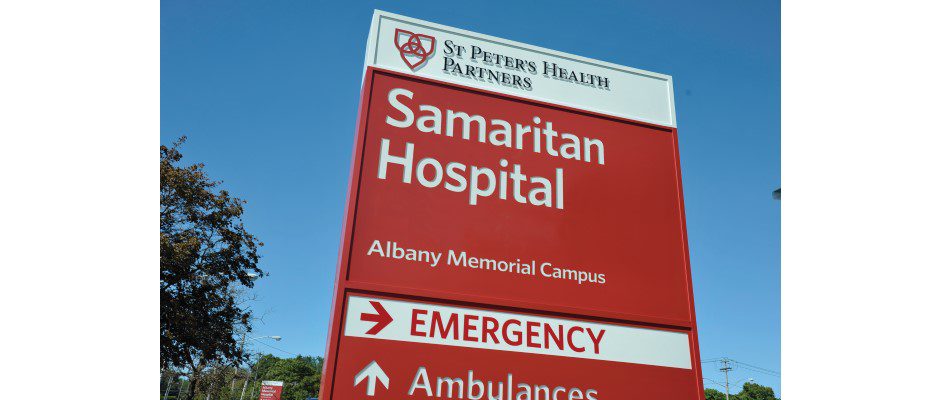
Officials of Northeast Health and St. Peter’s Health Care Services announced today an agreement to enter formal negotiations intended to lead to an affiliation of the two organizations.
Members of the Boards and CEOs of Northeast Health (Northeast) and St. Peter’s Health Care Services (St. Peter’s) have held informal discussions for several months to explore opportunities that would build on the unique expertise and strengths of the respective organizations.
Officials also announced that Seton Health (Seton) in Troy has initiated negotiations with Northeast and St. Peter’s to actively pursue a similar agreement. Expanding negotiations among all three systems greatly enhances the opportunities to strengthen the delivery of health care in our communities and achieve the unified goals of affiliation.
The announcement was made at a press conference held at Northeast Health in Troy. Press conference participants included: Steven Boyle, president, CEO, St. Peter’s Health Care Services; James Reed, M.D., president & CEO, Northeast Health; Gino Pazzaglini, president & CEO, Seton Health; Sydney T. Jones, III, chairman, Board of Trustees, St. Peter’s Health Care Services; Ann DiSarro, chair, Board of Directors, Northeast Health; and Sister Clarisse Correia, D.C., chair, Board of Trustees, Seton Health.
“The intention of entering these negotiations is to see if there are collaborative ways to improve quality, costeffectiveness and accessibility of health care in the Capital Region and beyond,” said Boyle of St. Peter’s. “These are institutions of very unique heritages. Initial discussions, however, indicate we have organizational cultures and missions that are far more common than they are different.”
“St. Peter’s has a mission to be a ‘transforming, healing presence within the communities we serve,’” Boyle said. “Most important for St. Peter’s is that Northeast Health and Seton share a strong, values-based dedication to address today’s challenges and improve the health status of our communities.”
“For some time, Northeast Health and St. Peter’s have had informal conversations on how to best address health care issues within our communities,” Dr. Reed said. “Both organizations are committed to quality, excellence, and innovation in services and technology; have always attracted and retained dedicated and skilled physicians and staff; and have demonstrated a willingness to work collaboratively to improve the quality of health care and senior services across the region.”
“Today, we begin the formal process to identify opportunities to work together more collaboratively and add another potential partner – Seton Health,” Dr. Reed noted. “Although the process is just beginning, one of the underlying tenets in these discussions is that needed community services are retained. We have a long road ahead, but we are excited about the potential benefits such affiliation could bring to our region.”
“For 158 years, Seton Health has demonstrated its commitment to providing a full continuum of health care services, always with special attention to the most needy,” Pazzaglini said. “We have also shown an eagerness to search out physicians and other providers who share similar values and help us carry our work forward.”
“St. Peter’s and Northeast Health both have remarkable records of clinical excellence and broad portfolios of services. Patients always come first…along with community-driven innovation,” Pazzaglini noted. “So, to create a groundbreaking, seamless system of health care on this scale is a unique opportunity which Seton Health is eager to pursue.”
Northeast, St. Peter’s and Seton, with nearly 12,000 employees in more than 125 locations throughout Tech Valley, provide a wide array of services to thousands of our region’s residents each day. These services include: St. Peter’s Hospital’s state-of-the-art tertiary care services, its Community Hospice, and two skilled nursing facilities; and Northeast’s Albany Memorial and Samaritan hospitals, Sunnyview Rehabilitation Hospital and The Eddy’s renowned eldercare services including skilled nursing, Alzheimer’s, Adult Day Services, home care and community services, and retirement and assisted living. Seton adds St. Mary’s Hospital, a skilled nursing facility, certified home care agency, 14 physician office locations and an array of specialty services.
“Memorandum of Understanding” Begins Affiliation Process
According to Board chairpersons Jones and DiSarro, the Boards of St. Peter’s and Northeast voted in separate sessions late Tuesday afternoon to approve a formal Memorandum of Understanding (MOU) between the two organizations. The MOU — a non-binding agreement — provides a basis for both organizations to evaluate the benefits to the community of affiliating. Seton’s Board also met on Tuesday and approved the beginning of formal talks with St. Peter’s and Northeast.
It is expected that all three of the institutions’ Boards will soon approve a similar MOU.
The Board Chairs said that the next course of action in the affiliation would be the “due diligence process.” This process would thoroughly review clinical, governance, regulatory, cultural and administrative data and issues to ensure that an affiliation is in the best interest of the communities served by the institutions. This would be followed by the development of a formal affiliation plan for approval by the institutions’ respective governing Boards.
The leaders said, “the institutions would take as long as needed to do a complete analysis of organizational and community benefit and plan development.” They indicated, however, they expect the initial step of the affiliation could be completed in approximately 12 months.
An expectation of the affiliation would be for the not-for-profit health systems to create a new not-for-profit organization that would become the “active parent corporation” for the Northeast, St. Peter’s and Seton health systems.
Affiliating to Better Meet the Health Care Needs of the Region
The rationale for the Northeast-St. Peter’s-Seton affiliation, at its core, is simple: the parties believe that, by combining their complementary strengths, they can significantly improve their ability to meet the health care needs of the region. The intention of any formal affiliation would be to:
- develop collaborative ways to deliver health care in a more coordinated, seamless fashion,
- improve efficiency and eliminate fragmentation of patient care, and
- improve access to care by the poor and underserved people in the Capital Region and beyond.
The affiliation supports the goal of the Berger Commission by giving the organizations the ability to better adapt health care services to meet community need. The 2001 report of the Institute of Medicine called, “Crossing the Quality Chasm: A New Health System for the 21st Century,” cites fragmentation of services as a fundamental flaw of the American health care system that needs to be eliminated. This is a key goal of the current affiliation discussions. The report called for fundamental change to close the quality gap and recommended a redesign of the American health care system.
The health systems have publicly placed quality of care at the top of their priorities. The systems intend to use the affiliation to build on the commitment to quality by sharing best practices, developing common policies, investing in the latest technologies, and drawing from the quality achievements of each.
Recognizing Differences and Ensuring Continuation of Services
The discussions between Northeast and St. Peter’s, and the resulting MOU document, recognize and respect the differences in the heritages and cultures of the partners. It is expected that the MOU to be developed with Seton will be very similar.
St. Peter’s and its current parent corporation, Catholic Health East (CHE), are Catholic. Northeast and its affiliates are secular. Northeast and St. Peter’s would maintain their secular and Catholic health care system identities, respectively. The new parent corporation would be a secular organization. The parent corporation would join Catholic Health East as a member.
The partners spent significant effort in addressing the Ethical and Religious Directives (ERDs) — directives that state ethical principles in health care that flow from the Catholic Church’s teaching. Northeast and St. Peter’s agreed that affiliation would include the adherence to the ERDs by all partners.
Adherence to the ERDs is already consistent with most practices and services at Northeast and St. Peter’s facilities. It became apparent, however, that Northeast would not continue to provide certain reproductive procedures.
To ensure these services continue to be provided, while still respecting the ERDs, Northeast and St. Peter’s officials consulted ethical experts and researched literature related to other secular/Catholic affiliations around the country. The result is the development of an alternative structure that supports Northeast’s heritage and the needs of its community.
Prior to formal affiliation, Northeast will help create a separate health care entity at Samaritan Hospital. The new entity will become a separately licensed, independent organization governed by its own board and with its own identity. The new entity will offer pre-natal care, birthing and sterilization procedures (tubal ligations and vasectomies), retaining these services at their current location and supported by the same physician practitioners. This new entity would require Certificate of Need (CON) approval from the New York state Department of Health.
Albany Memorial Hospital does not provide maternity services and provides a small number of reproductive procedures. The affiliation is not expected to impact care in the Albany community.
Samaritan and Albany Memorial hospitals perform a small number of abortions annually. Following the affiliation, abortions will not be provided. Northeast officials will consult with other health care providers in Rensselaer and Albany counties to ensure there is capacity to respond to this community need at other locations.
No Immediate Impact on Operation of Facilities or Staff
Northeast, St. Peter’s, and Seton will continue to operate all system-owned facilities. Community Hospice and the institutions’ respective charitable giving foundations would also continue as currently structured.
The management structure of the new organization will be developed and finalized during the due diligence period. The final management structure will be outlined in an affiliation plan that would be approved by the institutions’ Boards.
The proposed affiliation is not expected to disrupt physician practices at any hospital operated by St. Peter’s, Northeast or Seton. Medical staff governance will continue to respect the unique practice circumstances of each participating hospital. During the affiliation process, Northeast, St. Peter’s and Seton are expected to convene a Physician Task Force, made up of physicians from the organizations, to review important medical staff concerns and provide recommendations. It is believed a combined organization will help recruit new physicians to the Capital Region, a true community need.
No disruption of staff or management personnel is expected during the due diligence or approval period, as a result of this process. The hospital CEOs said, “It is important to note that the primary reason for this affiliation is not to reduce jobs. Northeast, St. Peter’s, and Seton are affiliating to explore health care reform – to improve when, where, and how care is provided. In fact, if we are successful, we expect that our organizations will grow.”
“These institutions have a tradition of valuing staff and minimizing the impact to staff as changes occur. Our goal is to continue that tradition as we move through the integration process.”





